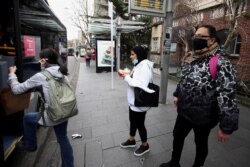COVID-19 restrictions are being relaxed in New Zealand as infection rates fall. In a four-tiered alert system, all but the nation’s biggest city, Auckland, will move to the lowest disease-control level, alert level one on Tuesday. Auckland will move to alert level two on Wednesday.
Health officials have said that by the end of September there is a 50-50 chance that New Zealand could eliminate the coronavirus once again. In June, Prime Minister Jacinda Ardern declared the country had united to “crush” the virus. A strict lockdown was imposed in March and April, and international borders were closed.
But in August a second wave of infections linked to a cluster of cases in the city of Auckland forced the government to bring back disease control measures. They seem to have worked, and the restrictions are being relaxed.
Auckland will move to alert level two in a four-tiered system on Wednesday, so gatherings of up to 100 people, instead of ten, will be permitted.
The rest of the country is now at level one. Life is beginning to resemble what it was before the pandemic. Masks are no longer mandated on public transport and planes, while the 100-person limit on social gatherings has been scrapped.
Prime Minister Jacinda Ardern says a cautious approach to opening New Zealand has been crucial.
“We know that the more our economy can be open with low or no levels of the virus the better our long-term economic picture," she said. "Our good case numbers and confidence in the management of the virus means we can proceed with the decisions we indicated would take place a week ago. For Auckland, that means we have accepted the recommendations of the director-general of health to move to full alert level two arrangements from 11.59 pm on Wednesday, September 23.”
New Zealand’s international borders remain closed to foreign nationals.
The government has agreed to buy approved coronavirus vaccines for up to 50 percent of the New Zealand population, along with the Pacific island states of Tokelau, the Cook Islands and Niue.
There are just over 60 active COVID-19 cases in New Zealand. In total, the South Pacific nation of five million people has recorded fewer than 1,500 infections during the pandemic, and 25 deaths.
New Zealanders vote in a general election next month, where the responses to the virus and the economic recovery will be key issues.






